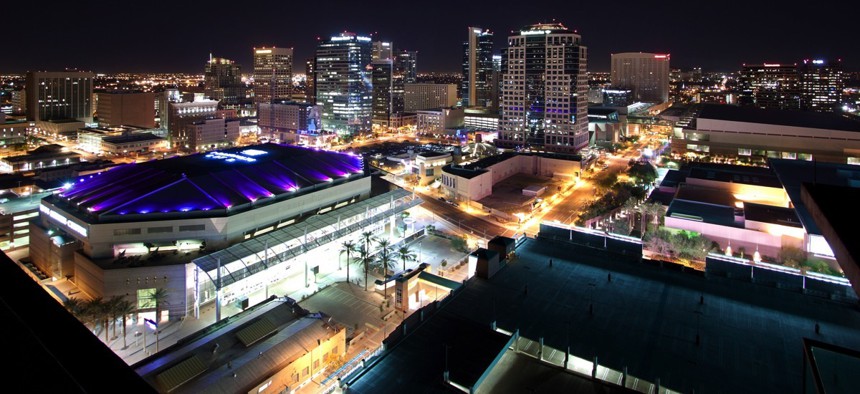Phoenix Takes First Steps Toward Circular Waste Economy

Downtown Phoenix, Arizona Alan Stark / Flickr via CC BY-SA 2.0
An organics capture system is the first big undertaking for the new Resource Innovation and Solution Network.
The city of Phoenix, in partnership with Arizona State University, spent the last 16 months convening public waste haulers in the metro area, six cities, two counties, and a Native American tribe to design an organics capture system.
Launched six months ago, the signature project of the recently formed Resource Innovation and Solutions Network (RISN) is examining how to geospatially collect the highest volumes of compost starting with green organics and then food scraps.
With 3.3 million residents, Phoenix is the fifth largest city in the nation. That number is projected to more than double by 2050, prompting the city’s mayor to set the goal of diverting 40 percent of all materials going into its landfills by 2020, so future generations won’t have to deal with a recycling problem.
“The whole idea of this is to take a look at the organics profile of the [Valley of the Sun] and see what’s possible, if we were to take a regionwide approach to collecting this material in such a way that it could be repurposed in a circular economy,” says Dan O’Neill, general manager of Walton Global Sustainability Solutions Services, in this YouTube video .
Currently, 20 percent of Phoenix’s solid waste is being diverted from landfills—up from 16 percent before RISN was created—and the city is working to transform its linear economy around garbage into a sustainable one that reuses materials.
RISN continues to enlist state, national and international public and private partners to collaborate around waste resource efficiency and effectiveness challenges. During the planning process, the partnership hosted regional workshops and designed more than 10 since-completed and ongoing projects.
Members of the City Council approved a contract with ASU in September creating the first municipality-pioneer university regional Circular Economy 100 hub.
The public-private partnership has identified a number of business opportunities now being offered as requests for proposals (RFPs) for education, communication and the reuse, remanufacture or repurposing of plastics, glass, boxes, landfill grass, and green organics.
“And so each one of these could become one or more new businesses that not only diverts material from the landfill but also creates new jobs and creates economic development here in the city of Phoenix,” O’Neill says.
(Photo by Alan Stark / Flickr via CC BY-SA 2.0)
Dave Nyczepir is News Editor for Government Executive’s Route Fifty.
NEXT STORY: U.S. Mayors Show Solidarity Following Deadly Terrorist Attacks in Paris






